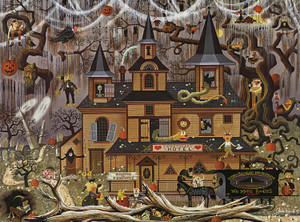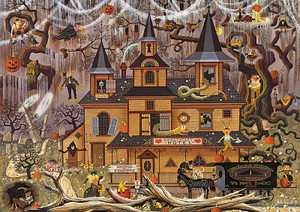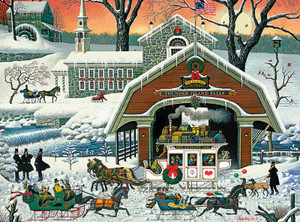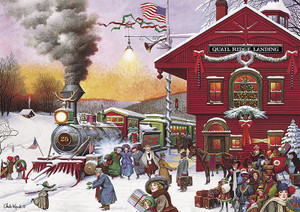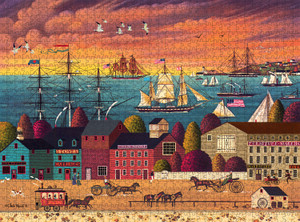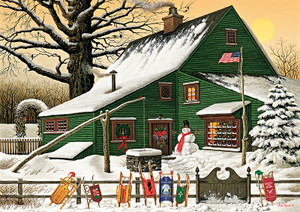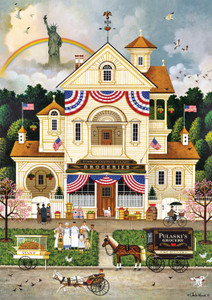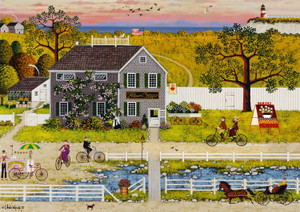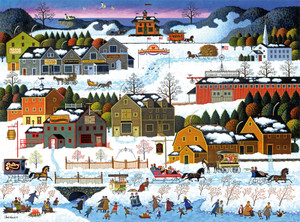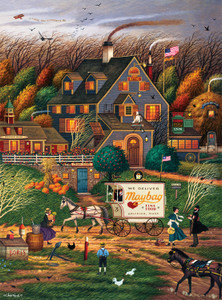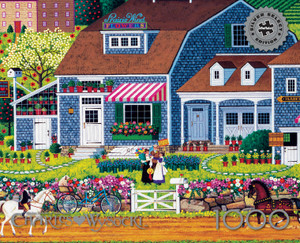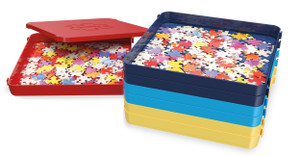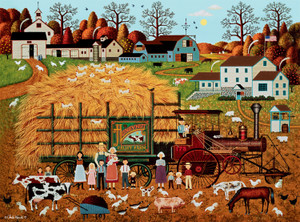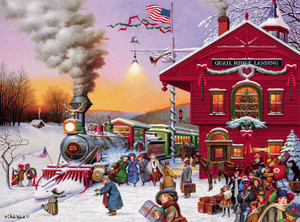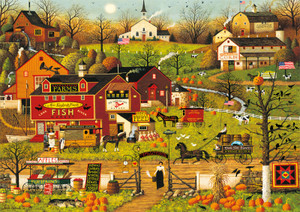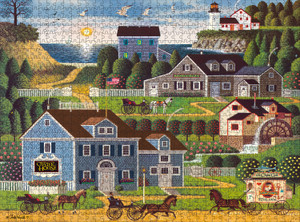Posted by Buffalo Games on Aug 17th 2022
What Personality Type Likes Jigsaw Puzzles?
Jigsaw puzzles are omnipresent in the average home’s social landscape, almost to the point that they blend in and become invisible.
What’s curious is how the tiniest scrutiny about why this is true reveals fascinating details about the people who turn to jigsaw puzzles as a family entertainment option. How you choose to solve or " play” a puzzle can reveal a lot about your individual tendencies.
This isn’t an investigation into your Meyers-Briggs personality type. It’s a fun little foray into the personality eccentricities that are stirred from hiding whenever the pieces of a jigsaw puzzle spill from the box onto the table.
Which personality types are naturally drawn to jigsaw puzzles? We’ll have a look at that. But first, here’s a little background on the behaviors that reveal these puzzling personalities.
Puzzling Methods
Are you the kind of puzzler who has “house rules” for jigsaw puzzles, or do you just wing it? Are you open to letting the puzzle “speak” to you (do you take a flexible approach to what should be prioritized), or does that feel chaotic?
Do you find yourself needing to finish the border before anything else? Do you sort the pieces, and by what criteria? Finally, are you an obsessive hoarder (do you hide or confiscate certain pieces to gain a competitive advantage)?
These aren’t the only methods puzzlers employ to satisfy the demands of the jigsaw muse, but they do bear a little examination.
House Rules
To be clear, there’s nothing wrong with having guidelines, especially when there are people crowded around a couple of thousand pieces of glorious jigsaw-shaped bliss on the kitchen table.
That pile of pieces represents potential, and (some say) the best way to get the most out of them is to go about solving the puzzle in an orderly fashion. They won’t have any talk of this “just solve it” nonsense; there must first be sorting and by more than one criterion:
- Borders
- Colors
- Shapes
- Image details
- Pieces that bear words
The orderly type insists that the only way to be able to get their arms around the challenge of the jigsaw puzzle is to put its mess into some kind of order. Before a single piece can be linked to another, sorting must take place. If it doesn’t, (some say) either the world will come to an end, or you can darn well solve it on your own.
Wingers
Those who wing it are of the opposite sentiment. For the wingers, it’s only going to be fun if there’s not so much ruthless organization. Sorting and thinking and analyzing are the best ways to take all the fun out of the experience of solving a jigsaw puzzle, at least for them.
This type usually lets the puzzle “speak” to them, trying likely pieces together in a trial and error methodology (which they would prefer that you don’t call a methodology).
Most of the time, this type builds the puzzle from a seemingly random glob of pieces that goes who-knows-where but is at least part of the overall solution.
There’s usually some drama when the border has been finished for some time, and yet it has become obvious that the winger’s part, now consisting of at least fifty pieces, must somehow be picked up, lifted over the border, and dropped into the middle where it belongs. Then, usually, there is some “discussion” about order vs. chaos and so on.
Borders, Sorters, Hoarders, and More
Some are predisposed toward framing the jigsaw puzzle first, which means setting the boundaries by joining all border pieces together as the only logical first step. Others prefer to sort by color, size, edge, and so on as their logical first step.
Still others are so obsessed that they pocket or hide some pieces so that they can be the one to place the much-needed and victorious final link.
Then, some begin by brewing coffee and proceed to “help” through idle chit-chat and interrogatives such as, “Oh, were you looking for this?” when discovering that the one piece you needed had been hiding beneath their coffee cup the whole time.
Extroverts
For the extroverted personality type, typically, those drawn to jigsaw puzzles are both intuitive and guided by their emotions. These extroverts can be either judgers or perceivers, but their draw toward puzzling is usually because they enjoy its social side.
These ENFJ/ENFP personality types may not necessarily be the “wingers” from above, but since they’re engaged not just for the task but for the relationship, they’ll be more open to sharing even if it means less order or structure.
Introverts
Introverted puzzlers are usually drawn to the challenge of a jigsaw puzzle because of a desire to find fulfillment or pleasure in completing a task. Instead of intuiting the abstract, they sense the real and provable. Rather than being guided by their feelings, they prefer to think and reason their way through.
This is why they approach the jigsaw puzzle primarily through the logical need to organize the pieces before beginning to solve the puzzle. These ISTP/ISTJ types might not be as sensitive to the relational dynamics of a group effort, viewing success more through the lens of whether the puzzle is getting solved or not.
What’s Your Type?
Jigsaw puzzles appeal to a wide range of people and personality types. The truth is, puzzles can be appealing to just about anyone; it’s just a matter of the setting.
If you’re tackling a 2000-piece puzzle as a group, it’s probably not a bad idea to agree to a few loose rules if you’re more into relationships and feelings. And if you’re more analytic and task-driven, it’s not a bad idea to bend a little on the rules so that people can have fun.
Whether you’re solving jigsaw puzzles in a group or prefer to fly solo, it’s cool to know how you’re wired, what draws you into the challenge, and what you need to prioritize to get the dopamine hit from a job well done. Just remember one thing – jigsaw puzzles are fun!




